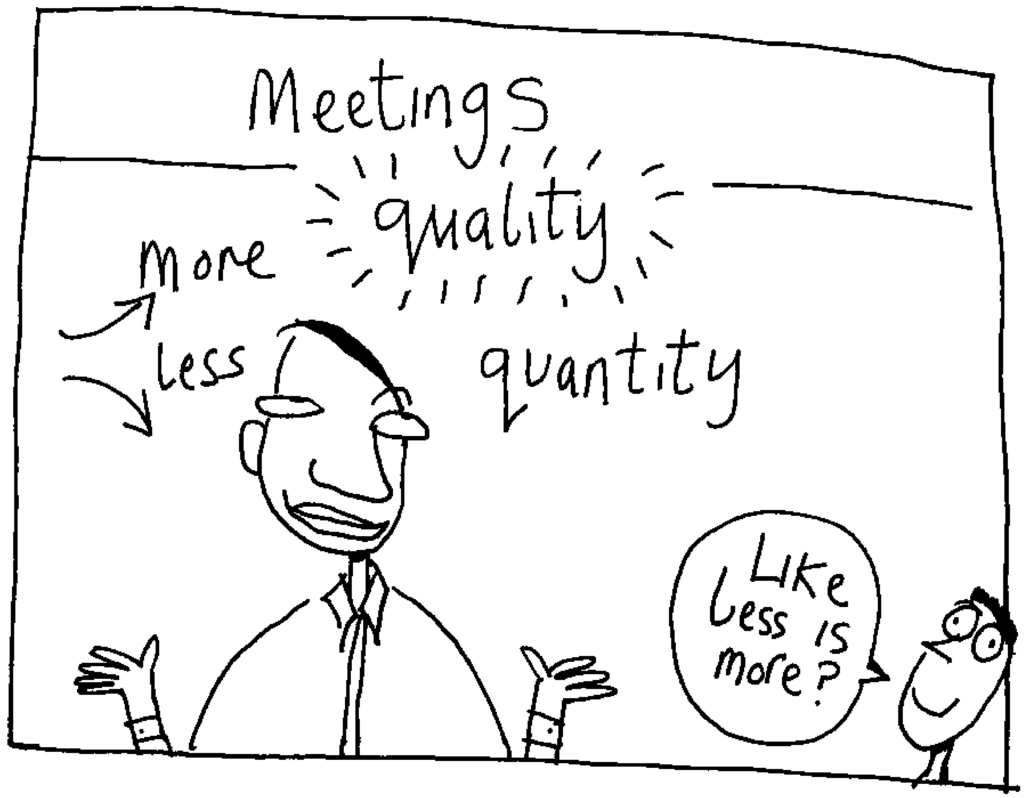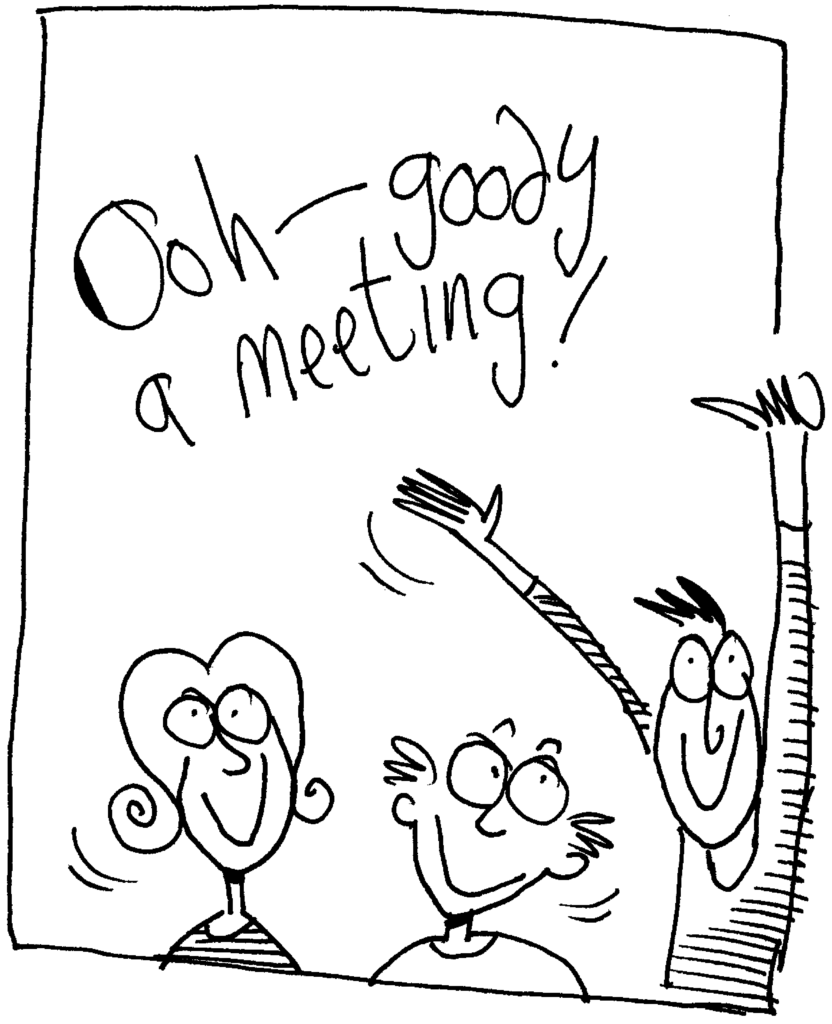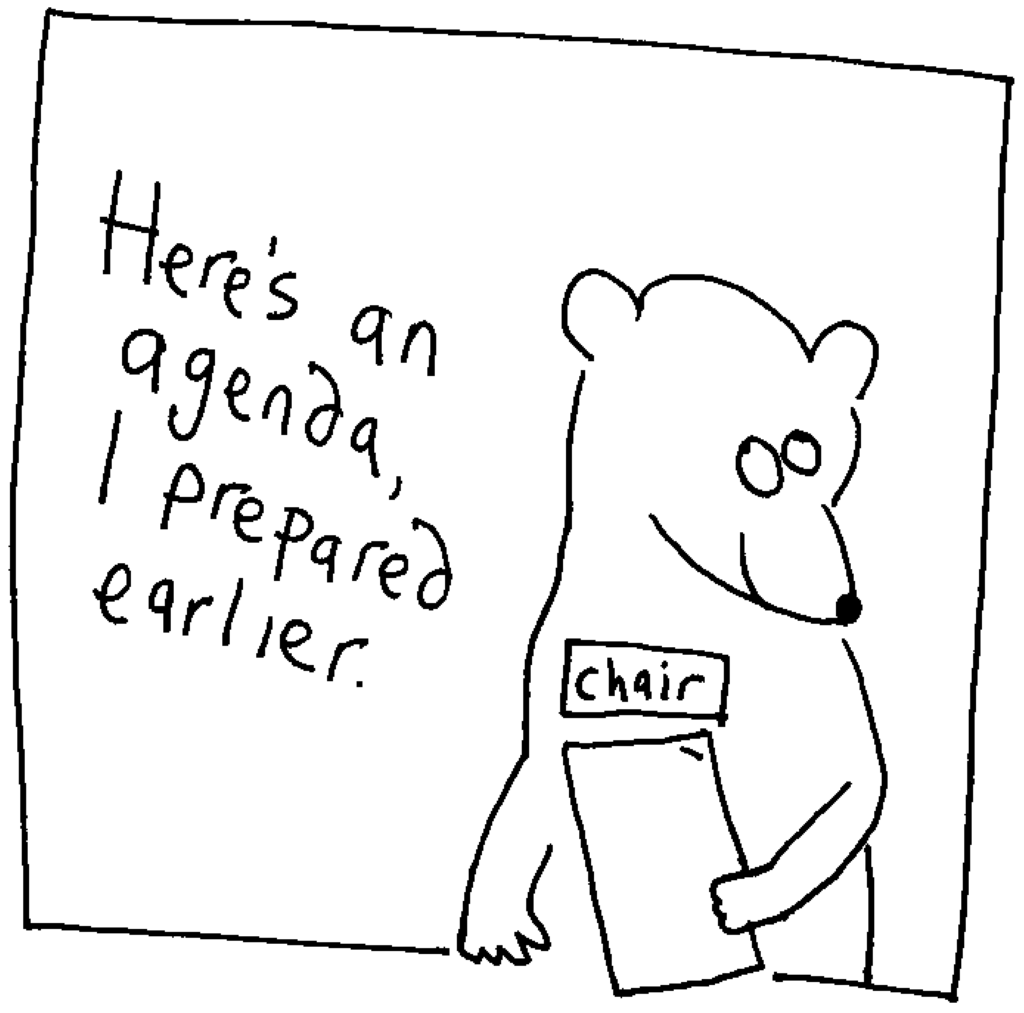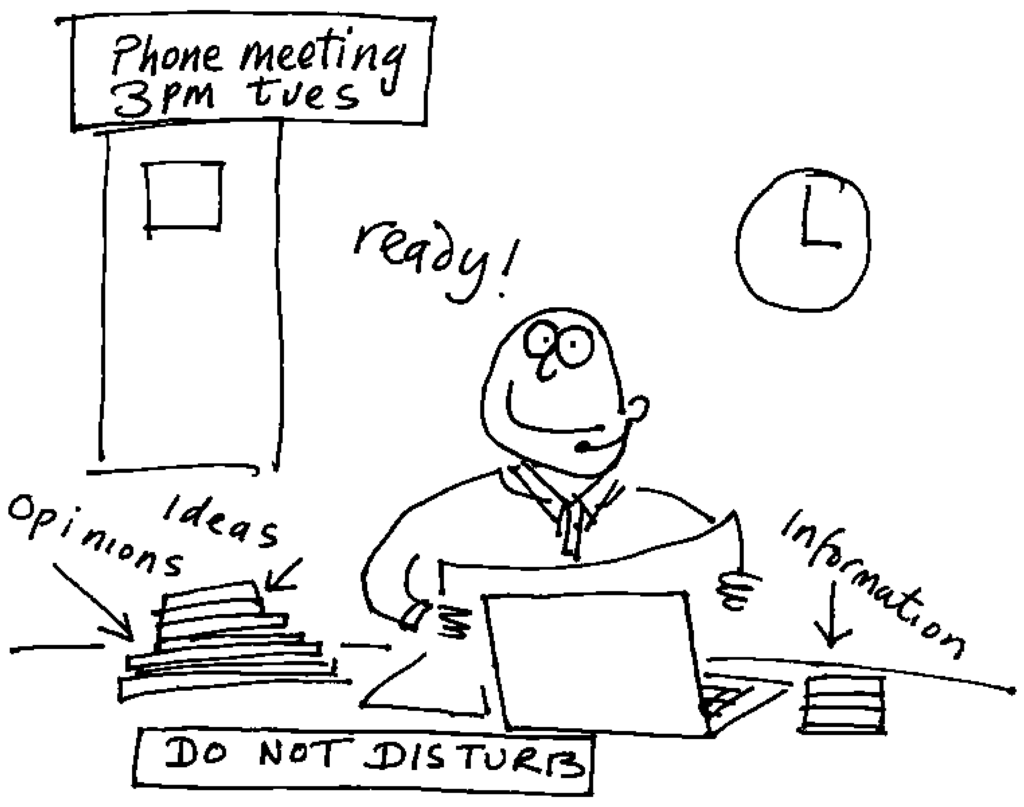Meetings and decision-making

Introduction
From conflict to co-operation aims to help co-operatives not only to deal with conflict when it arises (Chapter 1), but also to avoid unnecessary conflict by:
- Improving communication skills – Chapter 2
- Improving meetings and decision-making – this Chapter
- Managing change caused by organisational growth and development – Chapter 4
- Clarifying the roles and responsibilities of the board – Chapter 5
Effective decision-making is a crucial ingredient for success in a co-operative. This booklet looks at how to improve organisational decision-making. It identifies tools which will help you avoid conflict generated by ineffective meetings; a simple guide to the decision making process and principles and tools that support a deeper democracy for worker co-operatives.
Each indecision brings its own delays and days are lost lamenting over lost days… What you can do or think you can do, begin it. For boldness has magic, power, and genius in it.
In a worker co-operative, it’s sometimes not clear where authority and responsibility for decision-making lies. People may make the assumption that everyone decides – if that were the case, you’d never get any work done.
Unlike in many private enterprises, where a hierarchical structure clarifies where power and decision-making authority lies, in a worker co-op decision-making will be delegated according to the type of decision. There will be decisions reserved for the AGM, decisions that are taken in General Meetings, decisions that are part of each team or department’s remit and decisions which are contained in job descriptions or contracts.
Whether at the AGM or in your team many of the co-op’s decisions will be taken in meetings, which is why meeting skills are so vital. Meetings can be the site of conflict, but first of all:

Why hold a meeting?
Meetings are important, but they can also mop up a lot of time and resources. Do you actually need to have a meeting? Reasons why you might not:
- You want to share information (with no requirement for immediate feedback)
- There’s a policy you can follow
- The authority to take the decision is in your job description
- The authority to take the decision is within your team terms of reference
Sources and sites of conflict in meetings
Why is it that our meetings can be the source and/or the site of conflict? Some examples:
- Inadequate facilitation can mean that some people get more airtime than others, this can result in some members feeling less equal than others, and voicing their grievances elsewhere
- Poor communication skills: particularly a lack of active listening
- Inefficient decision making: if people aren’t trained or skilled in *consensus decision-making they may resort to voting if their consensus process fails. In a small team this can lead to poor decisions, which may then come back to the meeting again at a later date.
- Perfunctory planning: important decisions are left to the end of the meeting when people are tired; the venue of a face to face meeting does not take into account everyone’s access needs
- Low participation: if the team hasn’t focused on ensuring good levels of participation then it will always be the more experienced and opinionated who speak up, while the rest go along with it, not voicing their reservations
- Verbose minutes: as a result of trying to capture everything said, the minutes are too long, potentially inaccurate and can be the site of conflict when a team member denies making a comment which has been sketchily recorded.
And so on. We’re human; we make mistakes; we have our ‘real work’ to do; and (dangerously for a co-op) we don’t see the meetings as ‘real work’ when they are our most crucial and important tool for organising and decision-making.

*Consensus is a creative and co-operative way of reaching a group agreement. It means working together to find solutions that everyone actively supports.
However if not completely understood there can be problems:
- Agreement can get blocked by a minority
- People don’t always understand how to do it, it needs training and practice
- Voting may leave a minority dissatisfied, and disinclined to implement the decision or trying to overturn it
However, if you use consensus in your co-op, Seeds for Change produce an excellent handbook.
Tools and Techniques
Luckily all these problems can be resolved by good communication and meeting skills – especially since worker co-ops have discovered Sociocracy. Some useful tools and techniques can be found and guides and templates downloaded from Sociocracy for All and Circle Forward.
Facilitation
To facilitate means to make easy, and facilitation is about taking responsibility for making meetings as easy, inclusive and effective as possible. It’s based on the values of shared power, equality and the belief that everyone’s needs matter and all voices should be heard.
Facilitation is a highly useful skill to acquire – it can be learnt but you need plenty of practice and a supportive team to perform the role well. I say supportive team because the whole team needs to understand the role of the facilitator and support them in that role.
Seeds for Change describes the facilitator’s role as twofold:
- To create a space where everyone feels valued and is able to participate fully in discussions and decisions.
- To help the group work efficiently and get tasks done, such as sharing information, reaching decisions, airing conflict or getting on with jobs.

The facilitator is responsible for:
- Preparing the agenda with other team members, prioritising agenda items, allocating time to each one, and ensuring that important items are higher up the agenda than more trivial items
- Making sure that no one person dominates the meeting and everyone has the chance to speak, supporting and helping less voluble members to get their views across
- Building on agreement and moving the discussion along
- Clarifying the issues or positions of various parties before the meeting attempts to come to an agreement
- Summarising what has been decided and making sure everyone agrees (this helps the minute-taker)
- Allocating tasks, ensuring responsibility for action is clear and recorded
- Keeping to time
Although it is the facilitator’s job to see that all these things happen, it is equally the responsibility of everyone present at the meeting to support them in their role. Tasks such as timekeeping could be delegated to a member of the team.
The facilitator and minute-taker should work together – to ensure that the minutes are a correct record of decisions taken and action agreed.
It’s not the facilitator’s job to take minutes. They need to be watching other team members to encourage everyone’s participation, and listening to their contributions, which is difficult to do whilst writing!

Communication Skills
Perhaps the most crucial communication skill is active listening. Active listening means stilling your thoughts and opinions while focusing completely on what the other person is saying. It is a technique which can be used by two people attempting to understand their different points of view; and also in the case of a heated group discussion, the team can use the technique to really hear the views of team members who feel they haven’t been heard. See Chapter 2
Decision-making
Consent decision-making is an important element of Sociocracy, a self-governance system based on the values of equality. In consent decision making, objections are valued as a useful contribution to arrive at a decision which is in everyone’s ‘range of tolerance’. This concept comes from the theory of ecosystems and there’s a lovely explanation of it here.
We have consent when no-one impacted by the decision has any objections to it. By objection, we mean no one can identify a risk that the group cannot afford to take. Listening to objections means we are hearing and applying the wisdom of the whole group.
Our reactions to proposals will range from ideas we can wholeheartedly support and ideas we can live with to ideas which we cannot support and which are outside our ‘range of tolerance’. Understanding this, and that everyone’s range of tolerance will be different, gives us a fantastic tool for creative decision making.
An objection means that a proposal lies outside your range of tolerance. This may be for a variety of reasons:
- It does not match the co-operative’s vision or mission
- It constitutes a risk that in your opinion the co-operative cannot afford to take
- It conflicts with the co-operative’s stated purpose or strategies
- There is a condition that would make it very difficult for a member to perform their role
We have consent when everyone agrees that the proposal is “Good enough to try, safe enough to fail”
The protocol for achieving consent is based on a logical flow of actions as follows:
1. Clarify
- What needs to be decided
- Who is authorised to take the decision
- Who needs to be consulted


2. Collect information
- Frame the picture – list each of the elements that need to be addressed to generate a useful proposal
3. Explore the options
- Generate ideas to address each of the elements


4. Evaluate the options
- Shape a proposal
- Test for consent
- Set a review date
5. Implement, monitor and evaluate your decisions
- Implement your decision
- Observe what happens
- Evaluate the effectiveness of your decision at the agreed review date

NB: Sociocracy is a flexible system of governance in that it can be implemented gradually. For example you might start by using rounds in meetings and trying out consent decision-making – you don’t need to move over to a whole new governance system in one go. You might also try implementing some sociocracy concepts in just one team or department. Members could then share their experiences with other teams. There is plenty of support and help available at Sociocracy for All and Circle Forward, as well as experienced trainers here in the UK.
Participation and Planning
It’s helpful to have a short session at the start of the meeting where people can ‘check-in’ to the meeting. This is a space where people can share how they are as they arrive at the meeting and say if there’s anything that may impact their ability to participate. For example, if they are expecting an urgent phone call, or if they need to leave early; or if they’ve had a difficult meeting previously and might find it hard to concentrate.
For many people it’s easier to contribute in a small group of five or six, so for larger numbers consider using small groups for at least some of the time.
It’s not always helpful to draw attention to somebody who has not expressed their views. There may be a variety of reasons why they have not spoken, and people can feel patronised if the facilitator assumes they have not spoken through shyness or lack of confidence. It may be that they take time to think things through before expressing an opinion, or it may be that someone else has just voiced very similar views to their own. It’s more helpful to use one of the techniques for increasing participation that are described in Chapter 2.
Many co-ops have adopted the concept of Rounds from Sociocracy. Rounds is a simple but powerful tool for ensuring equality of voices in meetings. We simply take it in turns around the table (or around the screen in an online meeting). No-one is obliged to speak, but hearing others’ ideas in the go-round gives you time to reflect and to focus your thoughts. For people who habitually spend more time than others in thinking before speaking, or for those uncomfortable speaking in larger groups this is a boon as they have time to prepare themselves to speak.
Prior planning of the meeting will facilitate participation and improve decision-making. Choice of venue, timing of the meeting, layout of chairs and tables, lighting, heating and availability of refreshments will all impact on the extent to which people will feel empowered to participate.
People with responsibility for small children may find it difficult to attend early evening meetings. A meeting upstairs in a pub will exclude people who may struggle to use the stairs, but also those who do not wish to enter a venue where alcohol is available.
Depending on the expected length of the meeting and the time of day, it’s usually a good idea to offer food and drink (tea, coffee or soft drinks). It’s helpful to consider the reason for holding the meeting when it is being organised, for example:
- If it’s a meeting where lots of discussion and decision-making is expected, arrange the chairs around a large table, so that everyone can have eye contact and space for papers, notepads and laptops.
- If it is a meeting where you are about to explain a new marketing strategy or publicity campaign to employees or volunteers, arrange the chairs in rows so that everyone can see the presentation.
- For a strategic planning or training day, a ‘cabaret style’ arrangement works well. Medium sized tables are arranged in a large room, with 5 or 6 chairs at each table, so that people can talk to each other and work together in small groups as well as being able to watch presentations and participate in discussions involving the whole group.
- If the meeting is to be held online, via Zoom or one of the many other online meetings platforms it’s crucial to facilitate collaboration using the breakout rooms feature, and to use online collaboration platforms or tools to share ideas and build proposals. Issues such as timing, breaks and check-ins are perhaps even more important if you’re meeting remotely.
- Good online meeting etiquette will also facilitate participation
Agenda and Minutes
As mentioned above, it’s helpful if more critical issues are allocated more time and dealt with earlier in the meeting than the more trivial issues.
Conflict can be caused if a group spends more time on a fairly trivial matter – such as what colour to paint the shed – whilst important matters such as the budget get nodded through.
There are various reasons why this happens:
- Some people may feel that their knowledge of the topic is lacking, so don’t feel qualified to ask questions or comment. This is potentially dangerous for the co-op, and if this feels familiar, then it’s a training issue.
- It may be that the report is written in technical language or contains jargon or acronyms. It’s crucial that members understand all the reports brought to the meeting. If reports are not generally comprehensible, they should be re-written avoiding jargon and/or accompanied by illustrations such as pie charts, bar charts, or graphs.

There needs to be an agreed and understood process for getting items on to the agenda. Minutes can be a source of conflict, and taking the minutes is a skill that can really only be learned by doing it. Here’s some guidance
It’s helpful if your team or co-op spends a few moments considering the reason for keeping minutes.

If you believe it’s useful to keep a record of what everyone has said – beware. As we saw in Chapter 2, language can be a barrier as much as a bridge. Given the previous quote: “ I know that you believe you understand what you think I said, but I’m not sure you realize that what you heard is not what I meant.” we can be pretty sure that what the minute taker has written down may not reflect what the speaker intended.
I recommend action minutes – a record of:
- the decisions agreed
- whoever has been delegated to implement them
- the time frame
- any resources allocated.
That way you have a useful document that can (and should) be referred to at the next meeting in order to review progress.
Again Sociocracy offers a useful tool: Agenda/Minutes template
In true democracy every man and woman is taught to think for himself or herself.
Summary
Chapter Three looked at how ineffective meetings and poor decision making can cause conflict in a worker co-operative.
- We explored how conflict can be minimised or avoided by (as ever) improving communication skills – as referred to in Chapter Two; by developing good facilitation skills; and by using effective decision-making techniques, with a focus on consent decision-making.
- We also highlighted the importance of careful planning and attention to good participation techniques for conflict-free meetings.
- Finally we recommended action minutes – a record of decisions taken rather than a detailed narrative of who said what.
